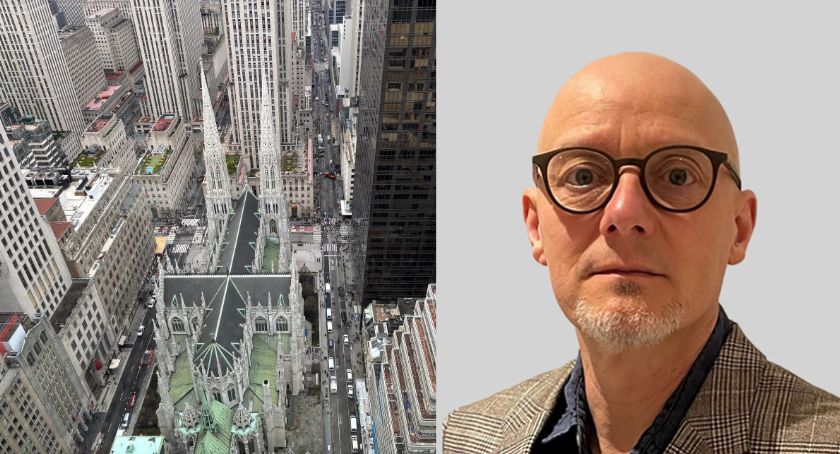DCAT Week
DCAT Week: Interview with Piramal’s Jean-Francois Carniaux
Jean-Francois Carniaux, VP and Global API Technical Lead, Piramal Pharma Solutions, discusses the state of the market, patient centricity, sustainability and more.

(L) The view from Piramal’s suite at DCAT Week. (R) Jean-Francois Carniaux.
DCAT Week, the global event held annually in New York City, caters to companies engaged in the bio/pharmaceutical manufacturing supply chain. It’s hosted by the Drug, Chemical & Associated Technologies Association (DCAT), a not-for-profit, member-supported, global business development association.
On the first day of the event—a rainy St. Patrick’s Day in the city—Contract Pharma met with Jean-Francois Carniaux, VP and Global API Technical Lead, Piramal Pharma Solutions. Read the interview in which Carniaux discusses the state of the market, patient centricity, sustainability initiatives, and more.
CP: We’ll start with a broad question. It’s only the first day, but do you have any key takeaways from DCAT week so far?
As you said, DCAT has been open for six hours. So, I think it’s a little bit early. I haven’t heard any of the announcements that took place earlier this morning, but from a CDMO point of view, and also from our customers’ point of view, there is a lot of hesitation in terms of investment. People are trying to understand exactly what the next few months are going to show us. In our case, instead of trying to wait for others to decide for us, we carry on with our strategy, and our strategy for the last couple of years has been to invest in science and to invest in people who are going to help the projects of a customer to move forward.
If you look at one or four API sites in Detroit, we invested around $32 million in 2020 to expand the API production and development. in 2023, we invested around $58 million for the expansion of our ADC manufacturing suite in Grangemouth, Scotland. Also, earlier this year, we announced an expansion of our fill finish site in Sellersville in the U.S. So, the organization has a clear plan to increase its capacity and its capabilities from drug substances to drug products, while also enhancing ADCs.
CP: You mentioned expansions in the United States. Do you anticipate challenges due to geopolitical developments?
We had the U.S. sites long before. I mean, if anything, if you look at the last year, there was a lot of consolidation in drug products. If you go back in time, a few years back, there was already a trend to do reshoring, which did do some very good things. I’m not sure it’s achieved as much as maybe what people were expecting at a time.
I can understand why people are being so careful, and I think it can be potentially damaging for our industry because we can sit and wait for things to open, but that’s not ideal. Having to check on multiple applications when you get up in the morning on where the wind is pushing is one way. Maybe that’s all right for a few months, but ultimately, it’s going to create a challenge. I think the winner will be people who decide to go ahead, as in our case. Our approach is ensuring that we’re investing in technical competency to ensure that we understand the needs from our customers. Piramal has a great advantage in that we have 15 sites across the globe, which all allow us to have a very big toolbox available for us to put in place for our customers and their customers, which are the patients.
Piramal is a patient-centric organization. What helps us to get up in the morning is to know that what we do, we’ll help patients. If you do that correctly, you’re doing good. And that’s really a critical element for us that drives our investment strategy as well as our people.
CP: Speaking of patient centricity, have there been any recently launched initiatives in this area? How have you been embedding that ethos into the organization?
If you were to visit a site of Piramal, you would be met at the entrance by what we call the PAC, which is the Patient Awareness Council, or the patient centricity team. There is one of these teams at every site and they are there to demonstrate and drive our patient-centric approach. The aim is to ensure that patient centricity is not just a buzzword. It’s a driver in our way of doing.
The PAC makes sure that projects are patient-focused. They understand what patients want and make sure that the company’s systems and processes are patient-friendly. The PAC also helps Piramal update its protocols to meet new standards and make things better for patients. Ultimately, our goal is to bring the drug as quickly as possible in a safe manner to the patient at a reasonable cost for everybody.
CP: I would like to discuss sustainability. I understand that it is a significant focus for Piramal. What’s a notable development or initiative related to sustainability that you have recently implemented?
One of the bigger accomplishments was converting coal-fired steam boilers at our Digwal and Pithampur, India sites to operate on biomass briquettes, a renewable energy fuel source. Digwal is our largest API commercial manufacturing site in India. Meanwhile, Pithampur is the biggest drug product commercial manufacturer for our organization. Both sites are running the briquettes, and the idea is you’re recycling the biomass and you’re minimizing the carbon contribution. So, that’s something that’s quite critical.
CP: Is there any other new development that you want to highlight?
For me, the most exciting recent development is the introduction of modern technology to help the sustainability of our processes. So, everybody speaks about AI. When you have a commercial manufacturer, you can observe AI making significant improvements in various aspects. One notable application is optimizing your manufacturing cycle time. Another use is identifying so-called “golden batches.” We are currently exploring these areas from both an operational excellence perspective and an AI perspective.
Also, from a technology perspective, what excites me is the better utilization of existing tools. Introducing a new tool is akin to its inherent weaknesses. The crucial factor lies in choosing the tool that aligns with our capabilities rather than its potential. I can’t entice a customer by saying, “Look, I can use this fantastic flow technology! It’s incredibly exciting! Oh, by the way, you’re not going to gain anything in terms of cost, and it doesn’t bring any safety.” While it may be intellectually stimulating, if its usability and benefits to the patient are lacking, we will reconsider its implementation.



